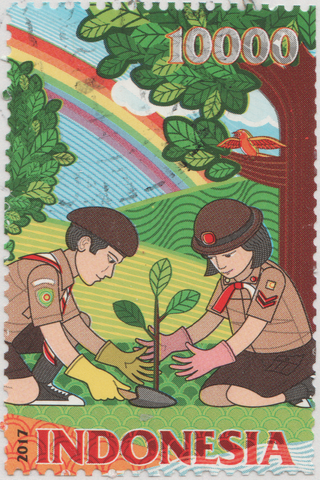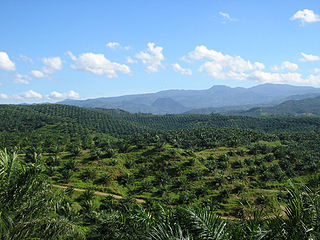
Palm oil is an edible vegetable oil derived from the mesocarp of the fruit of the oil palms. The oil is used in food manufacturing, in beauty products, and as biofuel. Palm oil accounted for about 33% of global oils produced from oil crops in 2014. Palm oils are easier to stabilize and maintain quality of flavor and consistency in processed foods, so are frequently favored by food manufacturers. On average globally, humans consumed 7.7 kg (17 lb) of palm oil per person in 2015. Demand has also increased for other uses, such as cosmetics and biofuels, creating more demand on the supply encouraging the growth of palm oil plantations in tropical countries.

Illegal logging is the harvest, transportation, purchase, or sale of timber in violation of laws. The harvesting procedure itself may be illegal, including using corrupt means to gain access to forests; extraction without permission, or from a protected area; the cutting down of protected species; or the extraction of timber in excess of agreed limits. Illegal logging is a driving force for a number of environmental issues such as deforestation, soil erosion and biodiversity loss which can drive larger-scale environmental crises such as climate change and other forms of environmental degradation.

IOI Corporation Berhad commonly referred to as IOI, was incorporated on 31 October 1969 as Industrial Oxygen Incorporated Sdn Bhd. IOI is one of Malaysia's biggest conglomerates. It ventured into property development in 1984, followed by oil palm plantations and refineries in 1985. IOI was listed on the Kuala Lumpur Stock Exchange (KLSE) and trading as MYX: 1961—now known as Bursa Malaysia—in 1980.

Environmental issues in Indonesia are associated with the country's high population density and rapid industrialisation, and they are often given a lower priority due to high poverty levels, and an under-resourced governance.

Sustainable forest management (SFM) is the management of forests according to the principles of sustainable development. Sustainable forest management has to keep the balance between three main pillars: ecological, economic and socio-cultural. Sustainable forestry can seem contradicting to some individuals as the act of logging trees is not sustainable. However, the goal of sustainable forestry is to allow for a balance to be found between ethical forestry and maintaining biodiversity through the means of maintaining natural patterns of disturbance and regeneration. The forestry industry mitigates climate change by boosting carbon storage in growing trees and soils and improving the sustainable supply of renewable raw materials via sustainable forest management. Successfully achieving sustainable forest management will provide integrated benefits to all, ranging from safeguarding local livelihoods to protecting biodiversity and ecosystems provided by forests, reducing rural poverty and mitigating some of the effects of climate change. Forest conservation is essential to stop climate change.

Wild Asia is a social enterprise, headquartered in Kuala Lumpur, focusing on conservation of natural areas and support of local communities dependent upon natural resources.

This article describes the use and availability of biodiesel in various countries around the world.

Agriculture in Indonesia is one of the key sectors within the Indonesian economy. In the last 50 years, the sector's share in national gross domestic product has decreased considerably, due to the rise of industrialisation and service sector. Nevertheless, for the majority of Indonesian households, farming and plantation remains as a vital income generator. In 2013, the agricultural sector contributed 14.43% to national GDP, a slight decline from 2003's contribution which was 15.19%. In 2012, the agricultural sector provides jobs to approximately 49 million Indonesians, representing 41% of the country's total labor force.
There are various social, economic, environmental and technical issues with biofuel production and use, which have been discussed in the popular media and scientific journals. These include: the effect of moderating oil prices, the "food vs fuel" debate, poverty reduction potential, carbon emissions levels, sustainable biofuel production, deforestation and soil erosion, loss of biodiversity, effect on water resources, the possible modifications necessary to run the engine on biofuel, as well as energy balance and efficiency. The International Resource Panel, which provides independent scientific assessments and expert advice on a variety of resource-related themes, assessed the issues relating to biofuel use in its first report Towards sustainable production and use of resources: Assessing Biofuels. In it, it outlined the wider and interrelated factors that need to be considered when deciding on the relative merits of pursuing one biofuel over another. It concluded that not all biofuels perform equally in terms of their effect on climate, energy security and ecosystems, and suggested that environmental and social effects need to be assessed throughout the entire life-cycle.

The use of biofuels varies by region. The world leaders in biofuel development and use are Brazil, United States, France, Sweden and Germany.

Deforestation in Malaysia is a major environmental issue in the country. Between 1990 and 2010, Malaysia lost an estimated 8.6% of its forest cover, or around 1,920,000 hectares. Logging and land clearing, particularly for the palm oil sector, have been significant contributors to Malaysia's economy. However, as a megadiverse country, efforts have been made to conserve Malaysia's forests and reduce the rate of deforestation.
This article addresses various criticisms of Cargill Inc, a privately held "agribusiness" multinational giant" with operations in 70 countries, and its headquarters in Minneapolis, Minnesota, in the United States. Cargill Inc, which has been owned by the Cargill family for 154 years, is the largest privately owned corporation in the United States, with an annual revenue of $113.5 billion in 2019.
Palm oil, produced from the oil palm, is a basic source of income for many farmers in South East Asia, Central and West Africa, and Central America. It is locally used as cooking oil, exported for use in much commercial food and personal care products and is converted into biofuel. It produces up to 10 times more oil per unit area than soybeans, rapeseed or sunflowers.
Wilmar International Limited is a Singaporean food processing and investment holding company with more than 300 subsidiary companies. Founded in 1991, it is one of Asia's leading agribusiness groups alongside the COFCO Group. It ranks amongst the largest listed companies by market capitalisation on the Singapore Exchange (SGX), being the second largest as of September 2010. It was ranked 211th in the Fortune Global 500 list in 2020. It was ranked 3rd in the World's Most Admired Company by Fortune in 2019.

Deforestation in Indonesia involves the long-term loss of forests and foliage across much of the country; it has had massive environmental and social impacts. Indonesia is home to some of the most biologically diverse forests in the world and ranks third in number of species behind Brazil and the Democratic Republic of Congo.

The Roundtable on Sustainable Palm Oil (RSPO) was established in 2004 with the objective of promoting the growth and use of sustainable palm oil products through global standards and multistakeholder governance. The seat of the association is in Zurich, Switzerland, while the secretariat is currently based in Kuala Lumpur, with a satellite office in Jakarta. RSPO currently has 4,706 members from 94 countries.

Palm oil production is important to the economy of Indonesia as the country is the world's biggest producer and consumer of the commodity, providing about half of the world's supply. In 2016, Indonesia produced over 34.6 million metric tons of palm oil, and exported 25.1 million metric tons of it. Oil palm plantations stretch across 12 million hectares, and is projected to reach 13 million hectares by 2020. There are several different types of plantations, including small, privately owned plantations, and larger, state- owned plantations. There are a variety of health, environmental, and societal impacts that result from the production of palm oil in Indonesia. A recent publication by the NGO Rainforest Action Network (RAN) indicates that the use of palm oil by some of the biggest chocolate and snacks' producers is increasing this problem.

Palm oil production is vital for the economy of Malaysia, which is the world's second- largest producer of the commodity after Indonesia. The Malaysian Palm Oil Board (MPOB) is a government agency responsible for the promotion and development of the palm oil sector in the country. The country's palm oil industry produces about 90 million tonnes of lignocellulosic biomass, including empty fruit bunches, oil palm trunks, and oil palm fronds, as well as palm oil mill effluent (POME). In 2010, in response to concerns about social and environmental impact of palm oil, the Malaysian Government pledged to limit palm oil plantation expansion by retaining at least half of the nation's land as forest cover.

Musim Mas Group operates globally in the palm oil industry, with a presence in 13 countries spanning Asia-Pacific, Europe, North America, and South America. The group owns a significant network of palm oil refineries and is involved in vegetable oil refining. Additionally, it manufactures consumer goods such as soap and cooking oil brands in Indonesia. With a workforce of 37,000 employees, Musim Mas is supported by an extensive logistics network consisting of chemical and coastal tankers, barges, tugboats, and bulk installations at major ports in Indonesia and other strategic locations worldwide.
Green imperialism or eco-imperialism or eco-colonialism or environmental imperialism is a derogatory epithet alluding to what is perceived as a Western strategy to influence the internal affairs of mostly developing nations in the name of environmentalism.
















